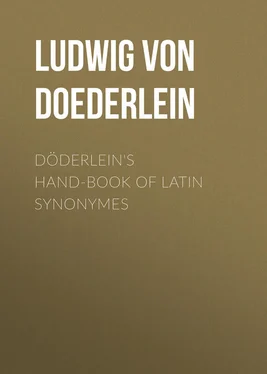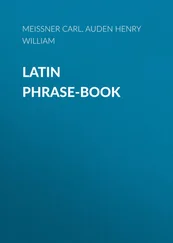Ludwig Doederlein - Döderlein's Hand-book of Latin Synonymes
Здесь есть возможность читать онлайн «Ludwig Doederlein - Döderlein's Hand-book of Latin Synonymes» — ознакомительный отрывок электронной книги совершенно бесплатно, а после прочтения отрывка купить полную версию. В некоторых случаях можно слушать аудио, скачать через торрент в формате fb2 и присутствует краткое содержание. Издательство: Иностранный паблик, Жанр: Языкознание, foreign_antique, foreign_prose, на английском языке. Описание произведения, (предисловие) а так же отзывы посетителей доступны на портале библиотеки ЛибКат.
- Название:Döderlein's Hand-book of Latin Synonymes
- Автор:
- Издательство:Иностранный паблик
- Жанр:
- Год:неизвестен
- ISBN:нет данных
- Рейтинг книги:3 / 5. Голосов: 1
-
Избранное:Добавить в избранное
- Отзывы:
-
Ваша оценка:
- 60
- 1
- 2
- 3
- 4
- 5
Döderlein's Hand-book of Latin Synonymes: краткое содержание, описание и аннотация
Предлагаем к чтению аннотацию, описание, краткое содержание или предисловие (зависит от того, что написал сам автор книги «Döderlein's Hand-book of Latin Synonymes»). Если вы не нашли необходимую информацию о книге — напишите в комментариях, мы постараемся отыскать её.
Döderlein's Hand-book of Latin Synonymes — читать онлайн ознакомительный отрывок
Ниже представлен текст книги, разбитый по страницам. Система сохранения места последней прочитанной страницы, позволяет с удобством читать онлайн бесплатно книгу «Döderlein's Hand-book of Latin Synonymes», без необходимости каждый раз заново искать на чём Вы остановились. Поставьте закладку, и сможете в любой момент перейти на страницу, на которой закончили чтение.
Интервал:
Закладка:
Cernere, see Videre .
Cerritus, see Amens .
Certare, see Imitatio .
Cessare, see Vacare and Cunctari .
Chorda; Fides. Chorda (χορδή is a single string; fides (σφιδή) in the sing. and plur. means a complete collection of strings, or a string-instrument.
Cibare, Cibus, see Alimenta .
Cicatrix, see Vulnus .
Cicur; Mansuetus. Cicur (redupl. of κορίζομαι) denotes tameness, merely in a physical sense, and as a term in natural history, in opp. to ferus ; whereas mansuetus, in a moral sense also, as implying a mild disposition, in opp. to sævus . (iv. 257.)
Cincinnus, see Crinis .
Circulus, see Orbis .
Circumire, see Ambire .
Circumvenire, see Fallere .
Cirrus, see Crinis .
Citus; Celer; Velox; Pernix; Properus; Festinus. 1. Citus and celer denote swiftness, merely as quick motion, in opp. to tardus , Cic. Or. iii. 57. Sall. Cat. 15. Cic. Fin. v. 11. N. D. ii. 20. Rosc. Com. 11. Top. 44; velox and pernix, nimbleness, as bodily strength and activity, in opp. to lentus ; properus and festinus, haste, as the will to reach a certain point in the shortest time, in opp. to segnis Gell. x. 11. 2. Citus denotes a swift and lively motion, approaching to vegetus ; celer, an eager and impetuous motion, approaching to rapidus . 3. Pernicitas is, in general, dexterity and activity in all bodily movements, in hopping, climbing, and vaulting; but velocitas, especially in running, flying, and swimming, and so forth. Plaut. Mil. iii. 1, 36. Clare oculis video, pernix sum manibus, pedibus mobilis. Virg. Æn. iv. 180. Curt. vii. 7, 53. Equorum velocitati par est hominum pernicitas . 4. Properus, properare, denote the haste which, from energy, sets out rapidly to reach a certain point, in opp. to cessare ; whereas festinus, festinare, denote the haste which springs from impatience, and borders upon precipitation. (ii. 144.)
Civilitas, see Humanitas .
Civitas, see Gens .
Clam, see Celare .
Claritas, see Gloria .
Clarus, see Celeber .
Claustrum, see Sera .
Clementia, see Mansuetudo .
Clivus, see Collis .
Clangere; Clamare; Vociferari. Clangere is the cry of animals and the clang of instruments, like κλάγγειν; clamare and vociferari, the cry of men; clamare, an utterance of the will, but vociferari, of passion, in anger, pain, in intoxication. Rhet. ad. Her. iii. 12. Acuta exclamatio habet quiddam illiberale et ad muliebrem potius vociferationem , quam ad virilem dignitatem in dicendo accommodatum. Senec. Ep. 15. Virg. Æn. ii. 310. Exoritur clamor que virum clangor que tubarum. (v. 103.)
“Clypeus” and “Codicilli” printed before “Clangere”.
Clypeus, see Scutum .
Codicilli, see Literæ .
Cœnum, see Lutum .
Cœpisse, see Incipere .
Coercere; Compescere. Coercere denotes restriction, as an act of power and superior strength; whereas compescere (from pedica, πεδᾶν) as an act of sovereign authority and wisdom. (iv. 427.)
Cœtus, see Concilium .
Cogere; Adigere. Cogere (from co-igere) means by force and power to compel to something; adigere, by reflection and the suggestion of motives to persuade to something. Tac. Ann. vi. 27. Se ea necessitate ad preces cogi , per quas consularium aliqui capessere provincias adigerentur . (vi. 70.)
Cogitare; Meditari; Commentari. 1. Cogitare (from the Goth. hugjan) denotes the usual activity of the mind, which cannot exist without thinking, or employing itself about something; meditari (from μέδεσθαι), the continued and intense activity of the mind, which aims at a definite result. Ter. Heaut. iii. 3, 46. Quid nunc facere cogitas ? Compare this with Adelph. v. 6, 8. Meditor esse affabilis. Cic. Cat. i. 9, 22. In Tusc. iii. 6, cogitatio means little more than consciousness; whereas meditatio means speculative reflection. 2. Meditari has an intensive meaning, with earnestness, exertion, and vivacity; commentari (only in Cicero) means to reflect leisurely, quietly, and profoundly. (v. 198.)
Cognatus, see Necessarius .
Cognitio; Notitia; Scientia; Ignarus; Inscius; Nescius. 1. Cognitio is an act of the mind by which knowledge is acquired, whereas notitia and scientia denote a state of the mind; notitia, together with nosse, denotes a state of the merely receptive faculties of the mind, which brings an external appearance to consciousness, and retains it there; whereas scientia, together with scire, involves spontaneous activity, and a perception of truth; notitia may be the result of casual perception; scientia implies a thorough knowledge of its object, the result of mental activity. Cic. Sen. 4, 12. Quanta notitia antiquitatis! quanta scientia juris Romani! 2. The ignarus is without notitia , the inscius without scientia . Tac. H. i. 11. Ægyptum provinciam insciam legum, ignaram magistratuum; for legislation is a science, and must be studied; government an art, and may be learnt by practice. 3. Inscius denotes a person who has not learnt something, with blame; nescius, who has accidentally not heard of, or experienced something, indifferently. Cic. Brut. 83. Inscium omnium rerum et rudem. Compare this with Plin. Ep. viii. 23, Absens et impendentis mali nescius . (v. 266.)
Cognoscere, see Intelligere .
Cohors, see Caterva .
Colaphus, see Alapa .
Colere, see Vereri .
Collis; Clivus; Tumulus; Grumus; Collis and clivus denote a greater hill or little mountain; collis (from celsus ) like κολωνός, as an eminence, in opp. to the plain beneath, and therefore somewhat steep; clivus, like κλιτύς, as a sloping plain, in opp. to an horizontal plain, and therefore only gradually ascending; whereas tumulus and grumus mean only a hillock, or great mound; tumulus, like ὄχθος, means either a natural or artificial elevation; grumus, only an artificial elevation, like χῶμα. Colum. Arbor. a. f. Collem autem et clivum , modum jugeri continentem repastinabis operis sexaginta. Liv. xxi. 32. Erigentibus in primos agmen clivos , apparuerunt imminentes tumulos insidentes montani. Hirt. B. Hisp. 24. Ex grumo excelsum tumulum capiebat. (ii. 121.)
Colloquium, see Sermo .
Colonus, see Incolere .
Coluber, see Anguis .
Coma, see Crinis .
Comburere, see Accendere .
Comere; Decorare; Ornare. 1. Comere and decorare denote ornament, merely as an object of sense, as pleasing the eye; ornare, in a practical sense, as at the same time combining utility. 2. Comere (κοσμεῖν) denotes ornament as something little and effeminate, often with blame, like nitere , in opp. to nature, noble simplicity, or graceful negligence, like κομμοῦν, whereas decorare and ornare, always with praise, like splendere , as denoting affluence and riches; decorare (from δίκη) in opp. to that which is ordinary and unseemly, like κοσμεῖν; ornare (from ὀρίνω?) in opp. to that which is paltry and incomplete, like ἀσκεῖν. 3. Comere implies only a change in form, which by arranging and polishing gives to the whole a smart appearance, as in combing and braiding the hair; but decorare and ornare effect a material change, inasmuch as by external addition new beauty is conferred, as by a diadem, and so forth. Quintil. xii. 10, 47. Comere caput in gradus et annulos; compare with Tibull. iii. 2, 6. Sertis decorare comas; and Virg. Ecl. vi. 69. Apio crines ornatus amaro. (iii. 261.)
Читать дальшеИнтервал:
Закладка:
Похожие книги на «Döderlein's Hand-book of Latin Synonymes»
Представляем Вашему вниманию похожие книги на «Döderlein's Hand-book of Latin Synonymes» списком для выбора. Мы отобрали схожую по названию и смыслу литературу в надежде предоставить читателям больше вариантов отыскать новые, интересные, ещё непрочитанные произведения.
Обсуждение, отзывы о книге «Döderlein's Hand-book of Latin Synonymes» и просто собственные мнения читателей. Оставьте ваши комментарии, напишите, что Вы думаете о произведении, его смысле или главных героях. Укажите что конкретно понравилось, а что нет, и почему Вы так считаете.












